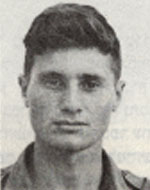Genscher, Dan (Danny)
Dan, son of Felice and Moshe, was born on 21.1.1949 in Concepcion, Chile, where he attended elementary school and in 1962 immigrated to Israel with his family. The family settled in Kibbutz Amir where he studied at the “Einot Yarden” educational institution. As a new immigrant, Danny encountered difficulties in absorption and adjustment. The different ways of thinking and the South American temperament often met with the barbed sabra barrier of kibbutz behavior, but Danny learned to penetrate and reach his friends and be absorbed into society by his ambition and musical talents. Dan was drafted into the IDF in late 1967 and assigned to the Armored Corps, where he completed a tank course, a tank commander course, an officers ‘course, and an armored officers’ course. On one of the days of the War of Attrition, the platoon that Danny commanded, on a tour of the northern section of the Suez Canal, was in a difficult area to cross, and an Egyptian ambush was set on fire. The Egyptians did so: In his tank he got on the dike and, exposed to the fire, paralyzed the enemy’s fire sources one by one. Sim was hit by the missiles that were fired at him, and Danny was nominated for a medal. He did not tell the story of any of his acquaintances, and this was known only by chance. At the end of October 1970, Dan completed compulsory service and went to work in the kibbutz’s metal factory, where he soon achieved considerable achievements. He devoted himself to his work in the factory and loved it. He found in it an expression of the ingenuity that was inherent in him and felt personal involvement in every professional and social matter in the enterprise. Danny was involved in the social life of the kibbutz, with all the energy and youthfulness that always characterized him. The kibbutz orchestra was perhaps one of the expressions. Amichai told him: “I remember the red-haired young man, hunched behind the drum set and beating the rhythms of the samba, bossa-nova and tango – with unceasing energy, to the point of exhaustion. The music was one of his deepest personal expressions. ” At that time Danny was the studio’s liaison with the kibbutz and in this studio he met Kati, his future wife. From the day she met she had always been together; Together they worked and worked in the kibbutz, and together they began to dream together. When they decided to set up the family nest, dreams of learning about higher education and acquiring a profession began to occupy an important place in Danny’s life. He hesitated – he saw his place in Kibbutz Amir, but at the same time did not want to miss the opportunity given him to realize his ambitions. He decided to study in the United States, where Kati’s parents lived, and said: “I’m going and I’ll be back. This is my home, and here I belong. “At the University of Philadelphia, Danny learned business administration and soon liked most of the people who came into contact with him, and when the first reports of the outbreak of the Yom Kippur War came, he made every effort to get a seat on the plane. His brother Lito went straight to Rafidim, where he did not find any tanks to go to battle, and after a rather long wait he finally took command of two tanks with improvised teams who had not known each other before. At the entrance to Ismailia, his tank was hit by a missile and Danny fell, brought to rest on Kibbutz Amir, leaving a wife, mother of two brothers and a sister. Kibbutz Amir published a pamphlet in his memory, including the words of his friends, and a memorial plaque in his name was inscribed in the University Library in Philadelphia.
